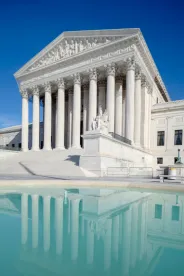Whether LGTBQ employees are protected from employment discrimination by Title VII of the Civil Rights Act will be decided by the U.S. Supreme Court next term.
The Court has agreed to hear three cases to determine:
-
Whether Title VII’s ban on “sex”-based discrimination prohibits discrimination based on sexual orientation; and
-
Whether Title VII prohibits discrimination against transgender claimants based on their status as transgender or based on sex stereotyping.
With these cases, the Supreme Court will address pending LGBTQ protections, providing much needed guidance to employers and employees.
Sexual Orientation under Title VII
The Supreme Court has agreed to hear two cases together in order to resolve a split in the U.S. Courts of Appeals on whether Title VII’s prohibitions against discrimination “because of sex” extends to discrimination based on sexual orientation.
In Zarda v. Altitude Express Inc. and Ray Maynard, 883 F.3d 100 (2d Cir. 2018), the Second Circuit held that Title VII extends to sexual orientation claims. Skydiving instructor Donald Zarda told one of his customers he was gay in an effort to make her more comfortable skydiving in tandem with him. Shortly after that, the customer’s boyfriend told the employer Zarda was gay and the employer fired Zarda. Zarda sued the employer for wrongful termination and discrimination in violation of Title VII. Refusing to dismiss the case, the Second Circuit joined the Seventh Circuit and the Equal Employment Opportunity Commission (EEOC) in holding Title VII extends to sexual orientation claims.
On the other hand, the Eleventh Circuit, in Bostock v. Clayton County, Georgia, 723 F. App’x 964 (11th Cir. 2018), held that Title VII does not apply to discrimination based on sexual orientation. Child-welfare-services coordinator Gerald Bostock claimed that after the employer learned he was gay, the employer falsely accused him of mismanaging public money in order to fire him. He claimed he was fired because of his sexual orientation.
Transgender Protection under Title VII
In the third case, the Court will clarify whether Title VII protections extends to discrimination based on gender identity.
In EEOC v. R.G. & G.R. Harris Funeral Homes Inc., 884 F.3d 560 (6th Cir. 2018), the Sixth Circuit held that Title VII prohibits discrimination based on gender identity. Aimee Stephens was a funeral director at a small funeral home. The employment records for Stephens identified her as a man when she was hired in 2007. In 2013, Stephens wrote a letter to her funeral home employer that she identified as a woman and wanted to wear women’s clothing to work after she returned from vacation. Within two weeks, the employer had terminated her employment based on the religious views of the organization. Stephens sued for discrimination under Title VII. The Sixth Circuit, siding with the EEOC, held that Title VII protects claimants based on gender identity from discrimination.
***
These cases will be heard as Altitude Express Inc. v. Zarda, No. 17-1623, Bostock v. Clayton County, Georgia, No. 17-1618, and R.G. & G.R. Harris Funeral Homes Inc. v. EEOC, et al., No. 18-107.
The outcome of these cases likely will have a major impact on numerous cases, federal and state legislation, employment decisions, and even political elections, as LGBTQ rights and protections continue to evolve.






 />i
/>i

